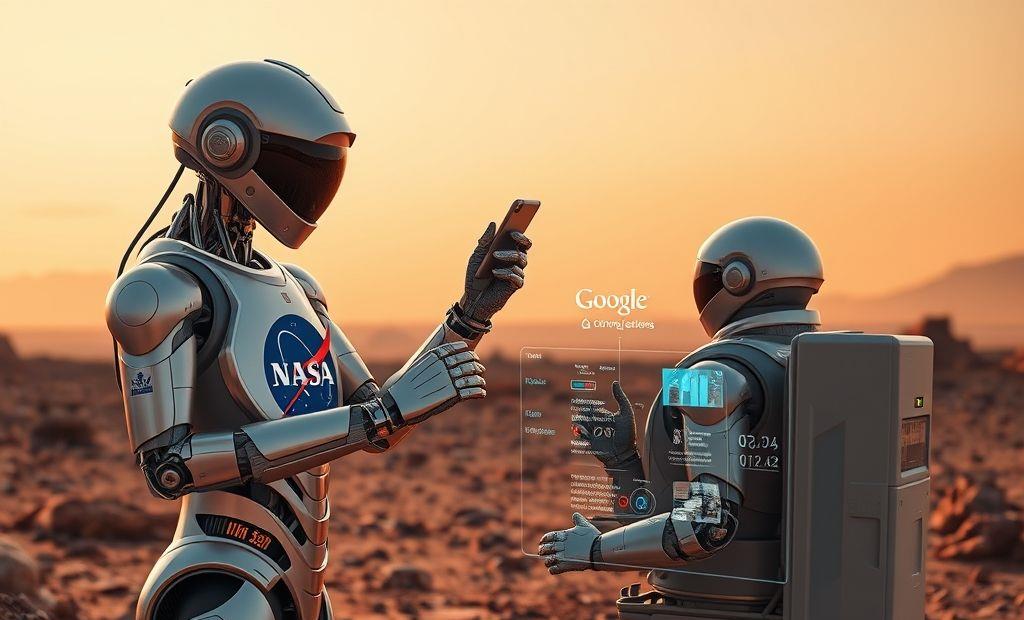NASA & Google AI: Medical Assistant for Mars Astronauts

AI Medical Assistant for Mars Missions: NASA & Google NASA and Google are collaborating to develop an AI-powered medical assistant designed to ensure the health...
⏱️ Estimated reading time: 3 min
Latest News
AI Medical Assistant for Mars Missions: NASA & Google
NASA and Google are collaborating to develop an AI-powered medical assistant designed to ensure the health and well-being of astronauts during long-duration missions to Mars. This innovative project aims to address the unique challenges of providing medical care in deep space, where immediate access to Earth-based medical professionals is impossible.
The Need for AI in Space Medicine
During a Mars mission, astronauts will face numerous health risks, including radiation exposure, bone density loss, and psychological stress. Without real-time support from doctors on Earth, the crew must rely on their own medical expertise and the resources available onboard. An AI medical assistant can provide crucial decision-making support, diagnostic capabilities, and treatment recommendations, significantly improving the chances of successful medical interventions.
Google’s Role in AI Development
Google’s expertise in artificial intelligence and machine learning is pivotal to the project. They are working to develop algorithms that can analyze medical data, identify potential health issues, and suggest appropriate treatments. This includes:
- Diagnostic Support: The AI can analyze symptoms and medical images to help diagnose illnesses or injuries.
- Treatment Recommendations: Based on the diagnosis, the AI can suggest the best course of treatment, including medication dosages and surgical procedures.
- Personalized Medicine: The AI can tailor treatment plans to individual astronauts based on their medical history and genetic information.
NASA’s Contribution to Space Medicine
NASA brings its extensive experience in space medicine and astronaut health to the partnership. They provide the data and resources necessary to train and validate the AI system. This includes:
- Medical Datasets: NASA provides access to a vast collection of astronaut medical data, including physiological data, medical images, and treatment records.
- Simulation Environments: NASA provides realistic simulation environments to test the AI system in conditions similar to those on a Mars mission.
- Expert Knowledge: NASA’s medical experts provide guidance and feedback to ensure the AI system is safe and effective.
Challenges and Future Directions
Developing an AI medical assistant for Mars missions presents several challenges. The system must be robust, reliable, and able to function autonomously in a resource-constrained environment. It must also be able to handle unexpected medical emergencies and adapt to new information.
Future research will focus on improving the AI’s diagnostic accuracy, expanding its knowledge base, and integrating it with other onboard systems. The ultimate goal is to create a comprehensive medical support system that can keep astronauts healthy and safe during their journey to Mars and beyond.
Related Posts
Bluesky Enhances Moderation for Transparency, Better Tracking
Bluesky Updates Moderation Policies for Enhanced Transparency Bluesky, the decentralized social network aiming to compete...
December 11, 2025

Google Maps: Gemini Tips, EV Charger Predictions & More!
Google Maps Gets Smarter: Gemini Tips & EV Updates Google Maps is enhancing user experience...
December 9, 2025

Adobe Acquires Semrush in $1.9B SEO Power Play
Adobe to Acquire Semrush for $1.9 Billion Adobe announced its agreement to acquire the search...
December 1, 2025











Leave a Reply